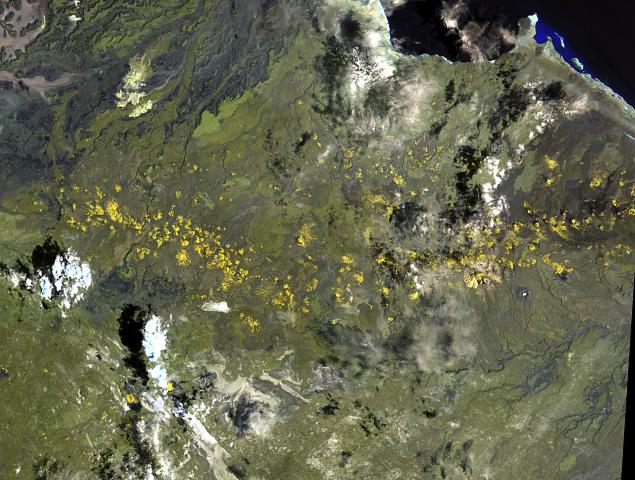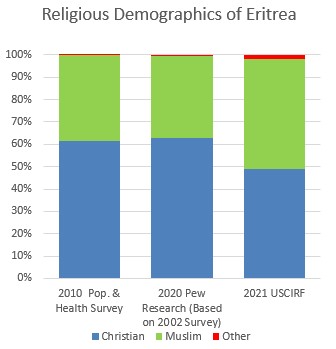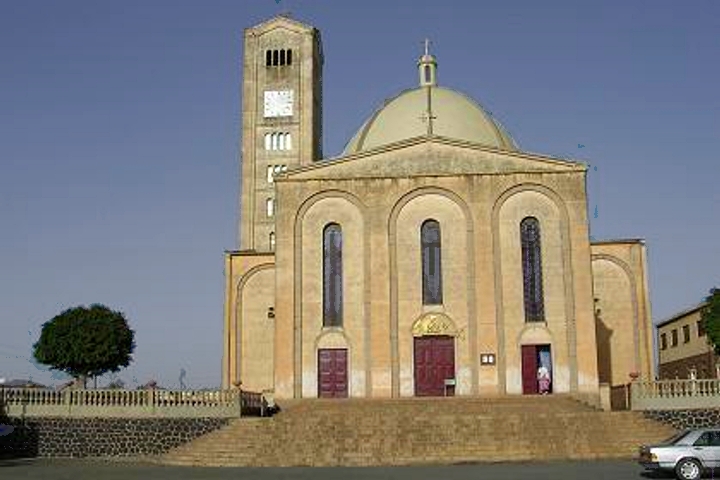|
Barentu, Eritrea
Barentu () is a town in north-western Eritrea, lying south of Agordat, and is the capital of Gash-Barka Region. The town is integrated with different types of tribes: Kunama, Nara, Tigre and Tigrinya being the most dominant. History It was mainly inhabited by the Nilotic Kunama people and Nara people in the past. The Nara people leader Shekaray Agaba was the first to build the town Umba Arenku which it means the white water. It is located in the Gash-Barka Zone of Eritrea. Barentu is the largest town in the Gash-Barka Zone in Eritrea, lying west of Asmara. It is the capital of the Gash-Barka and home of the Nara and Kunama Ethnic groups. The town has typically been a center of mining and agricultural activities for the area. During the Eritrean War of Independence the town was besieged. As part of the Eritrean-Ethiopian War of 1998-2000, the then flourishing town suffered major damage but has since undergone reconstruction. Thus it now attracts settlers from all parts of t ... [...More Info...] [...Related Items...] OR: [Wikipedia] [Google] [Baidu] |
Regions Of Eritrea
The regions of Eritrea are the primary geographical divisions through which Eritrea is administered. Six in total, they include the Central, Anseba, Gash-Barka, Southern, Northern Red Sea and Southern Red Sea regions. At the time of independence in 1993 Eritrea was arranged into ten provinces. These provinces were similar to the nine provinces operating during the colonial period. In 1996, these were consolidated into six regions (''zobas''). Gash-Barka Region was the largest and the most densely populated region and is called the "bread-basket". The People's Front for Democracy and Justice or PFDJ (originally Eritrean People's Liberation Front) rules the country and its regions as a single-party totalitarian government. The regional and local elections are conducted on a periodic basis on a restricted framework. All men and women of any ethnic or religious background are eligible to vote. No parties or groups other than PFDJ are allowed to contest and the elections are presid ... [...More Info...] [...Related Items...] OR: [Wikipedia] [Google] [Baidu] |
Siege Of Barentu
The siege of Barentu took place in 1977 in and around the town of Barentu in western Eritrea. It was jointly laid to siege by the Eritrean Liberation Front (ELF) and the Eritrean People's Liberation Front (EPLF) against the forces of Ethiopia. This was a decisive battle during the Eritrean War of Independence and marked the beginning of Soviet The Soviet Union,. officially the Union of Soviet Socialist Republics. (USSR),. was a List of former transcontinental countries#Since 1700, transcontinental country that spanned much of Eurasia from 1922 to 1991. A flagship communist state, ... involvement in the conflict. The battle The town of Barentu was defended by a large garrison of Ethiopian troops. The garrison had constructed numerous fortifications to improve the defensibility of the town. Furthermore, a local Kunama militia had been raised to support the Ethiopian troops. Of most significance in this battle however, was the decision by Soviet military advisers to comm ... [...More Info...] [...Related Items...] OR: [Wikipedia] [Google] [Baidu] |
Kunama Language
The Kunama language has been included in the proposed Nilo-Saharan language family, though it is distantly related to the other languages, if at all. Kunama is spoken by the Kunama people of the Gash-Barka Region in western Eritrea and just across the Ethiopian border. The language has several dialects including: Barka, Marda, Aimara, Odasa, Tika, Lakatakura, Sokodasa, Takazze-Selit and Tigray. Ilit and Bitama are not mutually intelligible and so may be considered distinct languages. There have been some use of the Kunama language in publications. "The first Bible translation product in Kunama was the Gospel of Mark prepared by Andersson and published in 1906." See also * Kunama word list (Wiktionary) References Relevant literature *Bender, M. Lionel. 1996. Kunama. Languages of the World/Materials 59. München: Lincom Europa. *Bender, Marvin Lionel. 2001. English-Kunama lexicon. ''Afrikanistische Arbeitspapiere'' 65: 201-253. *Idris, Nikodimos.1987. ''The Kunama and their ... [...More Info...] [...Related Items...] OR: [Wikipedia] [Google] [Baidu] |
Monotheistic
Monotheism is the belief that there is only one deity, an all-supreme being that is universally referred to as God. Cross, F.L.; Livingstone, E.A., eds. (1974). "Monotheism". The Oxford Dictionary of the Christian Church (2 ed.). Oxford: Oxford University Press. A distinction may be made between exclusive monotheism, in which the one God is a singular existence, and both inclusive and pluriform monotheism, in which multiple gods or godly forms are recognized, but each are postulated as extensions of the same God. Monotheism is distinguished from henotheism, a religious system in which the believer worships one God without denying that others may worship different gods with equal validity, and monolatrism, the recognition of the existence of many gods but with the consistent worship of only one deity. The term ''monolatry'' was perhaps first used by Julius Wellhausen. Monotheism characterizes the traditions of Bábism, the Baháʼí Faith, Cheondoism, Christianity,Christianity's ... [...More Info...] [...Related Items...] OR: [Wikipedia] [Google] [Baidu] |
Religion In Eritrea
Religion in Eritrea consists of a number of faiths. The two major religions in Eritrea are Christianity and Islam. However, the number of adherents of each faith is subject to debate. Estimates of the Christian share of the population range from 47% and 63%, while estimates of the Muslim share of the population range from 37% and 52%. Most Eritrean Christians belong the Eritrean Orthodox Tewahedo Church, although a minority is affiliated with the Eritrean Catholic Church and various Protestant denominations, respectively. Eritrean Muslims are predominantly Sunni. Apart from the officially recognized denominations of Christianity and Sunni Islam, all other faiths and denominations are in principle required to undergo a registration process; in practice they are not allowed to register. Among other things, the government's registration system requires religious groups to submit personal information on their membership to be allowed to worship. Faiths and denominations There are tw ... [...More Info...] [...Related Items...] OR: [Wikipedia] [Google] [Baidu] |
Eritrean Catholic Church
The Eritrean Catholic Church ( la, Ecclesia Catholica Erythraea; ti, ኤርትራዊት ቤተ ክርስቲያን, translit=Chiesa Eritrea) is a metropolitan ''sui iuris'' Eastern particular church headquartered in Asmara, Eritrea. It was established in 2015 by separation of its territory from that of the Ethiopian Catholic Church and the setting up in that territory of a new ''sui iuris'' metropolitan Eastern Catholic Church. It follows the Ge'ez form of the Alexandrian liturgical rite. Its strictly-speaking official name is "The Asmara metropolitan ''sui iuris'' Church". Like the other Eastern Catholic Churches, the Eritrean Catholic Church is in full communion with the Holy See. It holds to the Christological definition taught at the Council of Chalcedon and accepts the universal jurisdiction of the Pope. These points distinguish it from the Eritrean Orthodox Tewahedo Church, which is an Oriental Orthodox church comprising most Christians in the country. Like the Eritrean O ... [...More Info...] [...Related Items...] OR: [Wikipedia] [Google] [Baidu] |
Eritrean Orthodox Tewahedo Church
The Eritrean Orthodox Tewahedo Church ( ti, ቤተ ክርስትያን ተዋህዶ ኤርትራ) is one of the Oriental Orthodox Churches with its headquarters in Asmara, Eritrea. Its autocephaly was recognised by Pope Shenouda III of Alexandria, Pope of the Coptic Orthodox Church, after Eritrea gained its independence from Ethiopia in 1993. History Origins ''Tewahedo'' ( gez, ተዋሕዶ ''täwaḥədo'') is a Ge'ez word meaning "being made one", cognate to Arabic ''tawhid''. According to the ''Catholic Encyclopedia'' (1917 edition) article on the Henoticon: around 500 bishops within the Patriarchates of Alexandria, Antioch and Jerusalem refused to accept the "two natures" doctrine decreed by the Council of Chalcedon in 451, thus separating themselves from the rest of Christianity since that time. This separate Christian communion came to be known as Oriental Orthodoxy. The Oriental Orthodox Churches, which today include the Coptic Orthodox Church of Alexandria, the Armen ... [...More Info...] [...Related Items...] OR: [Wikipedia] [Google] [Baidu] |
Alegada
Samuel Alegada (born 4 August 1962) is a Filipino weightlifter. He competed in the men's bantamweight event at the 1988 Summer Olympics. Alegada later became a coach for the weightlifting national team of the Philippines. He was also the holder of men's 56kg Philippine national record which he set by lifting 115 kilograms at the 1991 Southeast Asian Games in Manila until it was broken by Nestor Colonia's 116 kilogram-lift at the 2011 Philippine National Games The Philippine National Games (PNG) officially known as the POC- PSC Games is a national multi-sport tournament in the Philippines. It was created as a means to determine the possible composition of national pool athletes that will compete in int ... in Bacolod. References External links * 1962 births Living people Filipino male weightlifters Olympic weightlifters for the Philippines Weightlifters at the 1988 Summer Olympics Place of birth missing (living people) 20th-century Filipino people {{Philippin ... [...More Info...] [...Related Items...] OR: [Wikipedia] [Google] [Baidu] |



_(Musée_du_Caire)_(2076972086).jpg)

